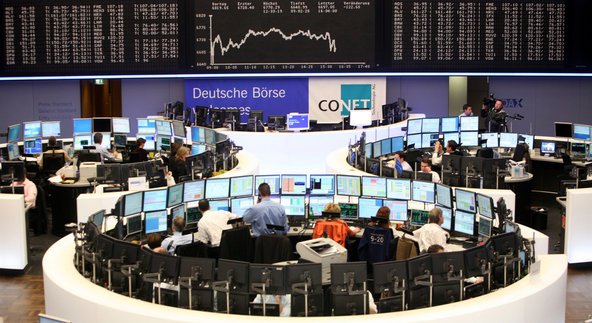 Alex Kraus/Bloomberg NewsTraders at the Frankfurt Stock Exchange.
Alex Kraus/Bloomberg NewsTraders at the Frankfurt Stock Exchange.
5:26 p.m. | Updated
BRUSSELS — The European Union’s competition commissioner, Joaquín Almunia, won support on Tuesday from European government representatives on an advisory panel in his effort to block a merger between NYSE Euronext and Deutsche Börse, a move that is one of the last stages before a formal decision on the deal is made early next month.
For months, the European Commission, the union’s executive body in Brussels, has raised concerns about the creation of the world’s biggest stock exchange company, which would operate both the New York Stock Exchange and the Frankfurt Stock Exchange along with other markets.
The recommendation by the antitrust advisory panel, which is not binding, is the latest sign that the regulatory obstacles in the way of the deal may be insurmountable. The deal would put the vast majority of the European exchange-traded derivatives market, and a sizable proportion of the region’s stock trading, in the hands of one company.
A main sticking point has been the refusal by NYSE Euronext and Deutsche Börse to sell parts of their derivatives exchange businesses, which Mr. Almunia has concluded would give the combined company too much power over derivatives trading.
That issue came to a head at a meeting in Brussels on Jan. 9, when Mr. Almunia asked Duncan L. Niederauer, the chief executive of NYSE Euronext, to sell a derivatives exchange known as Liffe, based in London, or withdraw from the deal.
“Of course not,” Mr. Niederauer told Mr. Almunia, according to a person with direct knowledge of meeting who asked not to be identified because the proceedings are still continuing. “There’s no way we’ll withdraw,” Mr. Niederauer told Mr. Almunia.
Mr. Niederauer told Mr. Almunia that the analysis carried out by European investigators was “deeply flawed” because it considered the market for derivatives to be solely European, rather than global, and made it appear that the merger would reduce competition far more than would be the case in practice.
NYSE Euronext executives have repeatedly argued that they face considerable competition from the CME Group, a derivatives exchange based in Chicago, saying that it has more employees in Europe than Liffe and a larger portfolio of interest-rate derivatives than the combined NYSE Euronext and Deutsche Börse businesses.
The firm stance taken by Mr. Niederauer — and his apparent willingness to see the deal blocked formally in Europe — may be a sign that the exchanges are preparing to sue the European Commission, accusing it of wrongfully stopping the deal.
That would be a serious problem for the commission, where officials still harbor painful memories of losing a string of appeals against blocked mergers early in the past decade after the European Court of Justice ruled that those decisions had been defective.
Since the meeting between Mr. Almunia and Mr. Niederauer, the exchanges have stepped up a lobbying campaign aimed at turning members of the European Commission in their favor.
On Friday, Mr. Niederauer and the Deutsche Börse chief executive, Reto Francioni, wrote a letter to José Manuel Barroso, president of the European Commission and Mr. Almunia’s superior, expressing “profound concern” that blocking the takeover “would represent a serious missed opportunity at a critical juncture for Europe.”
Mr. Niederauer and Mr. Francioni also sought to assure Mr. Barroso of “the European character of the new company,” which would generate 70 percent of its revenues in Europe and be incorporated in the Netherlands.
They also suggested that allowing the merger would further European goals of bringing changes in the financial services sector because NYSE Euronext and Deutsche Börse had “shown themselves to be a bridgehead of integrity and transparency against a tidal wave of opacity and greed that permeates the less-regulated segments of financial markets.”
Mr. Niederauer met with Viviane Reding, the European Union commissioner for justice, on Tuesday, apparently to reinforce that message.
Article source: http://dealbook.nytimes.com/2012/01/17/europe-leans-toward-blocking-nyse-deutsche-borse-merger/?partner=rss&emc=rss
